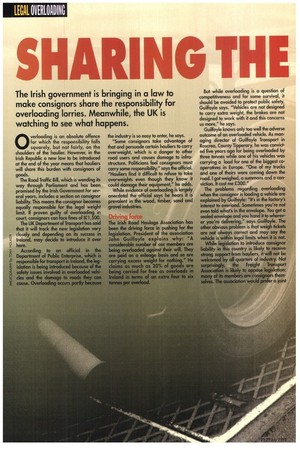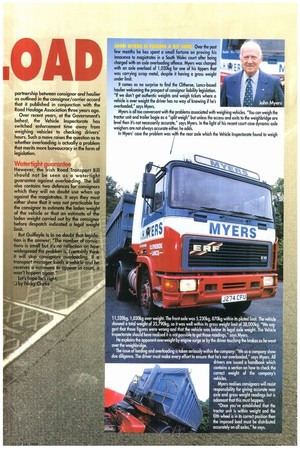SIIJIII 11G Til 1
Page 42

Page 43

If you've noticed an error in this article please click here to report it so we can fix it.
The Irish government is bringing in a law to make consignors share the responsibility for overloading lorries. Meanwhile, the UK is watching to see what happens.
0 verloading is an absolute offence for which the responsibility falls squarely, but not fairly, on the shoulders of the haulier. However, in the Irish Republic a new law to be introduced at the end of the year means that hauliers will share this burden with consignors of goods.
The Road Traffic Bill, which is wending its way through Parliament and has been promised by the Irish Government for several years, includes a section on consignor liability. This means the consignor becomes equally responsible for the legal weight limit. If proven guilty of overloading in court, consignors can face fines of 1E1,500.
The UK Department of Transport has said that it will track the new legislation very closely and depending on its success in Ireland, may decide to introduce it over here.
According to an official in the Department of Public Enterprise, which is responsible for transport in Ireland, the legislation is being introduced because of the safety issues involved in overloaded vehicles and the damage to roods they can cause. Overloading occurs partly because the industry is so easy to enter, he says.
"Some consignors take advantage of that and persuade certain hauliers to carry overweight, which is a danger to other road users and causes damage to infrastructure. Politicians feel consignors must carry some responsibility," says the official. "Hauliers find it difficult to refuse to take overweights even though they know it could damage their equipment," he adds. While evidence of overloading is largely anecdotal the official says he hears it is prevalent in the wood, timber, sand and gravel industries.
wing for
The Irish Road Haulage Association has been the driving force in pushing for the legislation. President of the association John Guilfoyle explains why: "A considerable number of our members are being overloaded against their will. They are paid on a mileage basis and so are carrying excess weight for nothing." He claims as much as 20% of goods are being carried for free as overloads in Ireland in terms of an extra four to six tonnes per overload. But while overloading is a question of competitiveness and for some survival, it should be avoided to protect public safety, Guilfoyle says. "Vehicles are not designed to carry extra weight, the brakes are not designed to work with it and this concerns us more," he says.
Guilfoyle knows only too well the adverse outcome of an overloaded vehicle. As managing director of Guilfoyle Transport in Roscrea, County Tipperary, he was convicted five years ago for being overloaded by three tonnes while one of his vehicles was carrying a load for one of the biggest cooperatives in Europe. "One of my trucks and one of theirs were coming down the road. I got weighed, a summons and a conviction. It cost me £300."
The problems regarding overloading when the consignor is loading a vehicle are explained by Guilfoyle: "It's in the factory's interest to overload. Sometimes you're not even told what's in the envelope. You get a sealed envelope and you hand it to wherever you're delivering," says Guilfoyle. The other obvious problem is that weigh tickets are not always correct and may say the vehicle is within legal limits when it is not.
While legislation to introduce consignor liability in this country is likely to receive strong support from hauliers, it will not be welcomed by all quarters of industry. Not surprisingly, the Freight Transport Association is likely to oppose legislation: many of its members are consignors themselves. The association would prefer a joint
partnership between consignor and haulier as outlined in the consignor/carrier accord that it published in conjunction with the Road Haulage Association three years ago.
Over recent years, at the Government's behest, the Vehicle Inspectorate has switched enforcement time away from weighing vehicles to checking drivers' hours. Such a move raises the question as to whether overloading is actually a problem that merits more bureaucracy in the form of legislation.
tertir'tguaramee
However, the Trish Road Transport Bill should not be seen as a watertight
I guarantee against overloading. The bill
also contains two defences for consignors which they will no doubt use when up against the magistrates. It says they must either show that it was not practicable for the consignor to estimate the laden weight of the vehicle or that an estimate of the laden weight carried out by the consignor before despatch indicated a legal weight limit.
But Guilfoyle is in no doubt that legislation is the answer: "The number of convictions is small but it's no reflection on how widespread the problem is. I certainly think it will stop consignors overloading. If a transport manager loads a vehicle and he receives a summons to appear in court, it won't happen again."
Let's hope he's right.
Over the past few months he has spent a small fortune on proving his innocence to magistrates in a South Wales court after being charged with an axle overloading offence. Myers was charged with an axle overload of 1,020kg for one of his tippers that was carrying scrap metal, despite it having a gross weight under limit.
It comes as no surprise to find the Clitheroe, Lancs-based haulier welcoming the prospect of consignor liability legislation. "If we don't get authentic weights and weigh tickets where a vehicle is over weight the driver has no way of knowing if he's overloaded," says Myers. Myers is all too conversant with the problems associated with weighing vehicles. "You can weigh the tractor unit and trailer bogie as a "split weigh" but unless the access and exits to the weighbridge are level then it's not necessarily accurate," says Myers. In the light of his recent court case dynamic axle weighers are not always accurate either, he adds.
In Myers' case the problem was with the rear axle which the Vehicle Inspectorate found to weigh 11,520kg, 1,020kg over weight. The front axle was 5,230kg, 870kg within its plated limit, The vehicle showed a total weight of 35,790kg, so it was well within its gross weight limit of 38,000kg. 'We suggest that those figures were wrong and that the vehicle was below its legal axle weight. The Vehicle Inspectorate should have realised it is not possible to gel those readings,' says Myers. He explains the apparent overweight by engine surge or by the driver touching the brakes as he went over the weighbridge. The issue of loading and overloading is taken seriously within the company: "We as a company show due diligence. The driver must make every effort to ensure that he's not overloaded," says Myers. All drivers are issued a handbook which contains a section on how to check the correct weight of the company's vehicles.
Myers realises consignors will resist responsibility for giving accurate rear axle and gross weight readings but is adamant that this must happen. "Once you've established that the tractor unit is within weight and the fifth wheel is in its correct position then the imposed load must be distributed • accurately on all axles," he says,




































































































